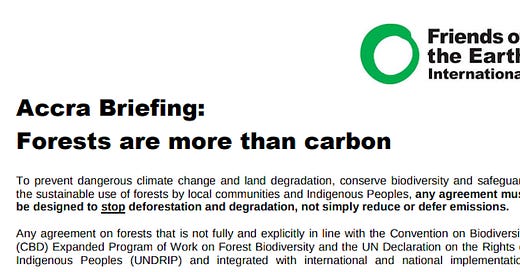FoEI: Forests are more than carbon
Over the next few weeks, we will make a series of posts of previously issued NGO statements about REDD. The first post is from Friends of the Earth International. This “Accra Briefing” was issued during the UNFCCC Accra Climate Change Talks 2008 (21-27 August 2008) in Ghana. We will post new statements about REDD as they come out.
Accra Briefing: Forests are more than carbon
FoEI , August 2008
To prevent dangerous climate change and land degradation, conserve biodiversity and safeguard the sustainable use of forests by local communities and Indigenous Peoples, any agreement must be designed to stop deforestation and degradation, not simply reduce or defer emissions.
Any agreement on forests that is not fully and explicitly in line with the Convention on Biodiversity (CBD) Expanded Program of Work on Forest Biodiversity and the UN Declaration on the Rights of Indigenous Peoples (UNDRIP) and integrated with international and national implementation policies under these instruments, undermines good forest practice. Any agreement must be developed through a joint process with other relevant forest conventions and human rights instruments and ensure full and effective participation of Indigenous Peoples and local communities.
Plantations are not forests. In the absence of a proper definition of forests, a REDD mechanism could be used to fund the expansion of plantations, even though they store, at best, only 20% of the carbon and a fraction of the biodiversity that old growth forests have. Large monoculture tree plantations, particularly genetically modified trees, have significant negative social and environmental impacts.
Land rights
More than one billion people, including 60 million indigenous people, are dependent on forests for their livelihoods, food and medicines. The recognition and enforcement of customary and territorial land rights of Indigenous Peoples and forest-dependent communities must be the basis of any forest policy.
If the financial value of forests increases, Indigenous Peoples and local communities will increasingly face the prospect of social dislocation and violent eviction, especially those with no formal land title. Any forest policy must be fully in line with principles of equitable sharing of costs and benefits.Keep forests out of carbon markets
Forest carbon markets will enable countries with emissions reduction responsibilities to avoid necessary economic transformation. A market REDD mechanism will create the climate regime’s biggest loophole, risking humanity’s ability to tackle climate change. This allows countries with high carbon intensive lifestyles to continue their inequitable and unsustainable consumption.
Funding forest and land conservation via carbon markets in particular will mean a loss of peoples’ sovereignty over natural resources and means to protect those natural resources. The use of carbon markets will also undermine public governance, weakening governments’ ability to protect and manage natural resources.
Carbon markets are often justified as the only feasible option to generate massive financing for REDD. This is based on significantly inflated estimates of the opportunity costs to be covered. A more accurate and fair estimate of the opportunity costs would calculate benefits lost to governments and people, instead of including corporate profits from deforestation and forest degradation.
In any case, if REDD credits were made fungible, they would flood carbon markets, causing the price of carbon to crash.
Equitable funding for stopping deforestation
Funding to stop deforestation should be invested in national programs and infrastructure that directly provide support to alternative, rights-based community-driven forms of forest conservation, sustainable management and ecosystem restoration.
There are relatively cheap options that could help prevent deforestation, through the implementation of deforestation bans and moratoria, and a global forest fire fighting fund to assist countries unable to prevent or stop forest fires. Insofar as funding is required to stop deforestation, alternative funding sources such as innovative carbon taxes in industrialised countries should be utilized instead of the carbon market, voluntary schemes or the World Bank Forest Carbon Partnership Facility.
Methodological issues
Many methodological problems are not simply technical issues but have significant implications for policy making.
Monitoring and verifying the carbon content and emissions reductions of forests is particularly complex and expensive. Policies to stop deforestation, as opposed to trading in emissions reductions, do not necessarily require such a complex and expensive monitoring and verification system. Further, focusing exclusively on the carbon value of forests neglects other crucial functions that forests play, especially conserving biodiversity and sustaining the livelihoods of Indigenous Peoples and local communities.
Any agreement on forests must recognize that ‘leakage’ encompasses more than just displacement of carbon emissions. The social and environmental problems associated with deforestation will inevitably shift if the underlying causes of deforestation are not addressed.
Forests are being impacted by climate change and if global temperatures increase further, they could switch from acting as carbon sinks to being net sources of carbon because of die-back or forest fires. The impermanence of forests also means that carbon investors would seek to shift the burden of delivering successful REDD projects onto project providers, which would be highly disadvantageous for local communities and/or developing countries.
Real solutions are needed to ensure climate justice
Tackling the drivers and underlying causes of deforestation is paramount. These include agrofuels and excessive meat and paper consumption in industrialised and other major importing countries. We must also stop destructive practices in mining, oil and gas exploration and extraction and industrial logging.
We need a just global transition to low carbon economies. Industrialised countries must take the lead by assuming responsibility to radically reduce emissions, as well as meet their obligations for financial and technology transfers to the South, exclusive of offsetting mechanisms, based on the climate debt that the North owes the South.
Friends of the Earth International, August 2008
For more information visit www.foei.org





